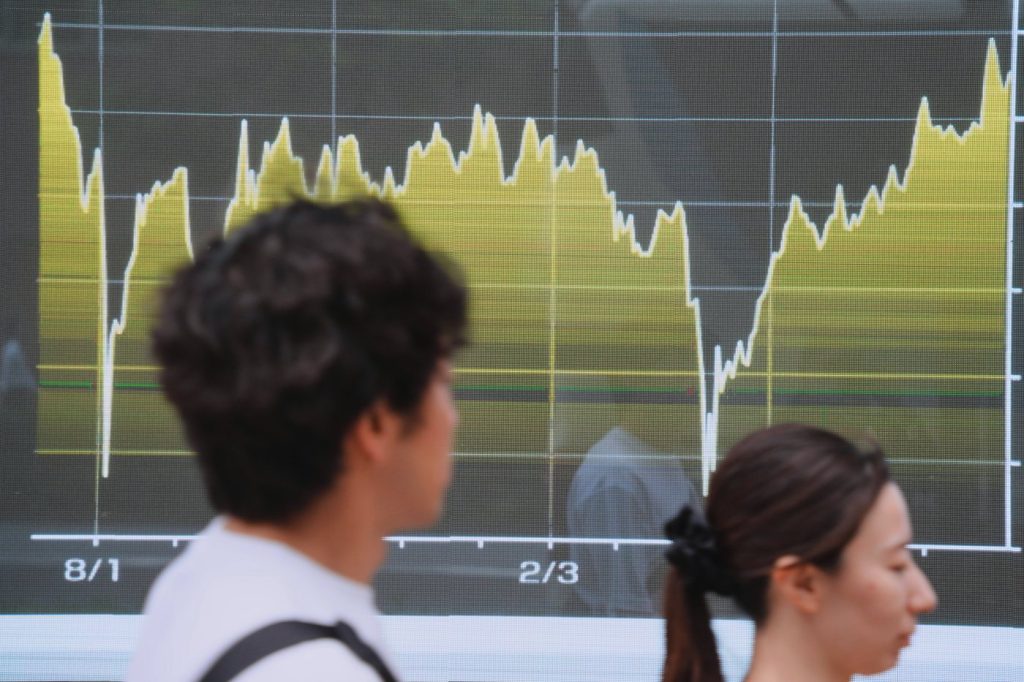Asian shares experienced a mostly positive trend in muted trading on Wednesday, reacting to the recent downturn in Wall Street shares fueled by discouraging economic indicators from the United States. Investors are closely analyzing a series of corporate earnings reports to evaluate the impact of U.S. President Donald Trump's tariffs on various businesses.
In Japan, notable companies such as Honda Motor Co. and Toyota Motor Corp., alongside the electronics and entertainment powerhouse Sony Corp., are scheduled to release their fiscal first-quarter results this week. This anticipation reflects the market's interest in how these firms are navigating the challenges posed by tariffs.
Japan's benchmark index, the Nikkei 225, saw a rise of 0.6%, closing at 40,777.45. Australia's S&P/ASX 200 also increased by 0.6%, reaching 8,822.90. Conversely, South Korea's Kospi index dipped by 0.3% to 3,187.57. Meanwhile, Hong Kong's Hang Seng rose slightly by 0.2% to 24,947.57, and the Shanghai Composite made a modest gain of 0.3%, finishing at 3,627.54.
U.S. futures recorded a modest increase of 0.3%. On the previous day, the S&P 500 index fell by 0.5% to 6,299.19, following a turbulent period marked by both its worst and best days since May. The Dow Jones Industrial Average declined by 0.1% to 44,111.74, while the Nasdaq composite experienced a 0.7% drop to 20,916.55.
A weaker-than-expected report indicating a slowdown in U.S. business activity, particularly in service sectors such as transportation and retail, has raised concerns regarding the adverse effects of Trump's tariffs on the economy. However, this situation has also sparked hopes that the Federal Reserve may consider cutting interest rates, which, alongside a wave of stronger-than-anticipated profit reports from U.S. companies, helped to soften the overall market losses. The S&P 500 remains within 1.4% of its all-time high.
With the recent surge in the U.S. stock market, there are heightened expectations for companies to deliver increased profits. This rally has sparked debates about whether the market has become excessively valued. To enhance the attractiveness of stock prices, companies will need to report significant profit increases, or there may be movements toward lowering interest rates, which is anticipated in the upcoming Federal Reserve policy meeting in September.
Expectations for a potential rate cut have surged, especially after a recent job market report fell short of economists' expectations. A decrease in interest rates would render stocks more attractive, potentially providing an additional boost to the broader economy. However, a concern remains that such actions could stimulate inflationary pressures.
In the bond market, Treasury yields witnessed a significant drop following the jobs report's release, with the yield on the 10-year Treasury note easing to 4.19% from 4.22% late Monday, and down from 4.39% prior to the jobs report release—a notable movement in the bond market context.
In energy trading, benchmark U.S. crude oil prices increased by 41 cents, settling at $65.57 per barrel, while Brent crude, the international benchmark, rose by 42 cents to reach $68.06 per barrel.
In the currency markets, the U.S. dollar fell to 147.34 Japanese yen from 147.61 yen. Meanwhile, the euro appreciated slightly, costing $1.1583, up from $1.1579.











